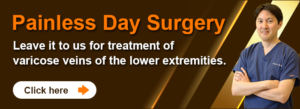Life After Varicose Vein Surgery
Hello, everyone! I’m Akira Saito, the director of The Varicose Vein Clinic TOKYO, a clinic specializing in varicose veins.
For those of you considering whether or not to undergo surgery for varicose veins:
I understand that you may be worried about the surgery itself, but you’re probably also concerned about what happens afterward.
“Will it hurt once the anesthesia wears off?”
“Will my leg swell? What about bruising? Will it recur?”
“How many days do I need to take off work?”
“When can I start taking baths again?”
“When can I resume exercising?”
“Will varicose veins recur after surgery?”
In this article, I’ll explain what to expect in life after varicose vein surgery and what you need to be mindful of.
The Day of Surgery
After the surgery, your leg will be wrapped in an elastic bandage and covered with compression stockings, which may make walking a bit difficult, but you can still walk and even do some shopping on your way home.
After Returning Home
Rest
There is no need for complete bed rest.
Pain Relief
Some patients experience pain once the anesthesia wears off, but most say, “It wasn’t painful enough to take painkillers, so I didn’t.” However, since the condition of varicose veins varies from person to person, so does the level of pain. There’s no need to endure the pain, so if you feel pain, take the prescribed pain medication.
What You Can Do
Daily activities such as cooking, laundry, and cleaning are perfectly fine.

What You Shouldn’t Do
The elastic bandage should not be removed until the next day, so no baths.
Cycling is also a no-go, as it can cause the elastic bandage to slip down.
Driving cars is also not recommended because sedatives administered during surgery might leave you drowsy.
As for alcohol, it’s best to avoid it on the day of surgery since it can be difficult to determine whether any discomfort is due to the surgery or the alcohol.
From the Day After Surgery
The elastic bandage will be removed the day after surgery. Since the varicose vein surgery we perform does not involve cutting the skin, there’s no need for stitches or sutures. The only mark left will be a small needle puncture, so there are no restrictions on daily activities starting the day after surgery.
Bathing
Bathing is permitted from the day after surgery.
Exercise
I recommend starting with light walking and gradually increasing the amount of exercise. Stop if you feel pain, and increase the intensity as the pain becomes tolerable. Adjust your exercise based on your pain level.
Returning to Work
In most cases, you can return to work whenever you feel ready.
Massage
There are no particular restrictions. Avoid areas that are tender when pressed.
Flying
You can fly as early as the day after surgery. Be sure to wear compression stockings during the flight.
Compression Stockings
If you’ve had endovenous laser ablation, you’ll need to wear compression stockings for about a month after surgery. These stockings help reduce temporary swelling and edema that may occur after surgery. While it’s very rare, deep vein thrombosis (long flight syndrome) can occur, so compression stockings are also worn as a preventative measure.
If you’ve had endovenous embolization (glue treatment), wearing compression stockings after surgery is not required.
Typical Post-Surgery Course
Bruising
Bruising varies by individual but typically disappears within a few days to two weeks.
Thigh Tightness
Those who have undergone endovenous laser ablation often feel tightness in the thigh, especially when standing up after sitting for a long time. However, this sensation typically lessens once you start walking. It usually subsides within one to two months.
Lumps
At our clinic, we perform varicose vein surgery without making incisions in the skin. We treat bulging varicose veins with a laser rather than removing them. As a result, the treated varicose veins may feel like hard lumps under the skin after surgery. Smaller varicose veins may be absorbed by the body within a few months, while larger ones may take about six months, but they will eventually disappear naturally.
If you have any concerns or questions, please don’t hesitate to consult your doctor.




